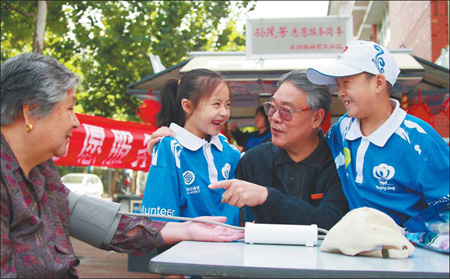Beijing's million-member army of National Day volunteers went on the march yesterday helping visitors pouring into the capital.
And what was the most common question asked by these newcomers attracted by massive celebrations and holiday?
 |
|
Volunteer Sun Maofang (2nd, R), 66, show young volunteers how to use a blood pressure monitor in Beijing yesterday. [China Daily] |
"Where's the toilet?" according to many volunteers.
With only 10 days to go to nation's 60th anniversary celebrations, Beijing dramatically bettered its successful Olympic volunteer campaign by doubling its 500,000-member volunteer team.
From primary school students to retired residents, nearly every one has been recruited and asked to do their bit and guide visitors in the right directions.
"We are Bejingers. If we don't do this responsibility, who else will do it," said Wu Jianxin, a community committee official, who looks after three hutongs near Dongsi area in downtown Beijing.
Having lived in an old alley in Dongsi for more than six decades, Grandpa Cao Yongxiang certainly knows his business well.
"I know nearly every face in the community, even those who rent houses here," said the 84-year-old.
"I was doing the same shift before the 50th anniversary celebrations in 1999 and during the Olympics."
And all types of tradesmen are being recruited.
"We have even urged the locksmith to be a security volunteer, because he knows the neighborhood and travels back and forth the area on his speedy motorbike," said Wu, pointing to a middle-aged man in a long brown coat with a red armband that reads in both Chinese and English: Beijing Security Volunteer.
Security volunteers also work as assistants to the local police, Wu said. Everything that goes on in the community during the day is under their watch while they return the patrol responsibilities to the police at night.
Restaurant owners, barbers and shopkeepers along Beijing's streets were all given a red armband and everybody is wearing them with pride.
"Every one gets one from the community committee. At least this is one of the universal benefits we receive as migrant workers in Beijing," joked Chen Gangquan, owner of a Sichuan restaurant.
The sea of red armbands will frighten the potential attackers, the community official explained.
The red armbands were seen in great numbers last Friday night as well as army officers and police on the Chang'an avenue, where armored vehicles of the Chinese army marched for their last National Day parade rehearsal.
Beijing's government has reactivated its city volunteers program during the weekend and more than 200 blue movable volunteer stations were reopened for the first time since the Olympics.
Volunteers wearing the blue uniforms, which copy the outfits worn during the Games, will start working four hours a day this week and next week, will double their working time to eight hours a day to help tourists find their way around.
"Chinese volunteers have found themselves more often on the front stage of major events after the Olympics," said Sun Maofang, a veteran volunteer in Beijing who has been teaching young students on volunteering after retiring from his army position in 2000.
"This is good. Volunteers should not be afraid of cameras. More people should know them."
Wearing a shining yellow uniform, a denim jacket and white cap Grandpa Cao is looking as fit as a fiddle.
"I have been pretty fit all these years, so I know I can handle my shift," said the senior resident.
The fit-looking old man has insisted keeping himself busy in the morning, so that he can prepare lunch for his laoban'er (elderly wife) in advance.
"In this way, I take both good care of my laoban'er and have enough time on my National Day shift," he added.
He was looking forward to the 60th anniversary event, and wanted to continue his mission for as long as he could.
"I am fit now and I will still be on shift for the 70th anniversary. I know that," said the old man, smiling.
(China Daily September 21, 2009)